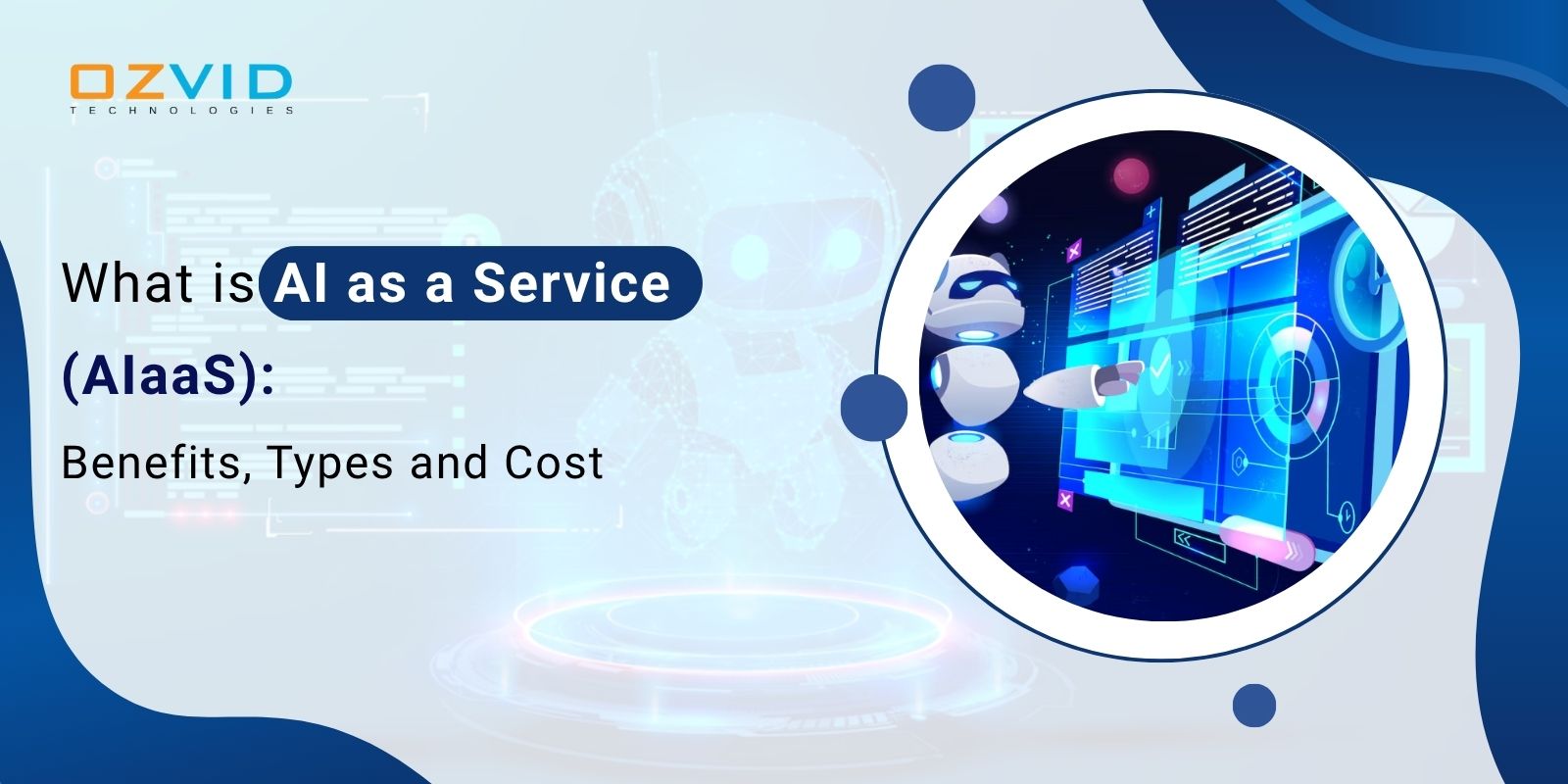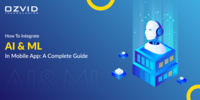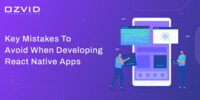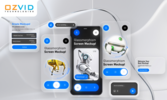- Jul 30, 2025
Share this post on:

In today’s highly competitive and data-driven digital landscape, Artificial Intelligence (AI) is transforming industries by enabling businesses to make smarter decisions, enhance customer experiences, and optimize operational efficiency. However, building AI infrastructure and tools in-house can be complex, costly, and time-consuming. That’s where AI as a Service (AIaaS) comes into play. It offers businesses the power of AI without the burden of heavy infrastructure or development overhead.
At OZVID Technologies, we believe that AIaaS is not just a trend—it is the future of scalable, intelligent business solutions. In this blog, we’ll explore what AI as a Service is, the different types of services it includes, why it is crucial for modern businesses, the benefits, cost factors, implementation strategies, emerging trends, and why OZVID Technologies is your ideal AI services company partner.
Key Takeaways
- AI as a Service (AIaaS) offers scalable, cost-effective access to advanced AI tools without heavy infrastructure investments.
- Businesses of all sizes can rapidly deploy AI capabilities like chat assistants, NLP, and predictive analytics using AIaaS platforms.
- AIaaS supports faster time-to-market, improved customer experience, and data-driven decision-making across industries.
- Implementation involves defining goals, preparing data, choosing the right provider, and starting with a pilot project.
- OZVID Technologies delivers reliable AI development services tailored to help businesses innovate and grow efficiently.
What is AI as a Service (AIaaS)?
AI as a Service (AIaaS) refers to the third-party offering of artificial intelligence services and tools over the cloud. It allows companies to integrate AI capabilities such as machine learning, natural language processing (NLP), computer vision, robotic process automation (RPA), and AI-powered analytics into their operations without investing in AI software or infrastructure from scratch.
Through AIaaS, organizations can leverage pre-built models or customize AI tools to meet specific business needs. This flexibility has made AI software development more accessible to companies of all sizes.
AIaaS is transforming how businesses interact with customers, optimize workflows, and make data-driven decisions. Whether you're using an AI chat assistant, intelligent automation, or predictive analytics, AIaaS makes deploying these tools faster, more cost-effective, and scalable.
Types of AI as a Service
AI as a Service (AIaaS) is a broad term that encompasses various tools and technologies delivered via cloud platforms, allowing businesses to incorporate artificial intelligence into their operations without developing systems from scratch. Depending on the business requirement and industry, AIaaS is offered in different forms. Below is a detailed breakdown of the major types of AIaaS widely adopted across sectors:
1. Machine Learning as a Service (MLaaS)
Machine Learning as a Service (MLaaS) refers to a set of cloud-based platforms that offer machine learning tools for model training, data preprocessing, and deployment. These services empower businesses to harness the power of predictive analytics and intelligent decision-making without needing a dedicated team of data scientists or heavy infrastructure.
Key Features:
- Data visualization tools
- Automated model selection and training
- APIs for easy integration
- Real-time predictions
Use Cases:
- Demand forecasting in retail
- Credit scoring in finance
- Predictive maintenance in manufacturing
AI development companies often provide MLaaS to help clients quickly implement customized models to solve specific business challenges.
2. Conversational AI and AI Chat Assistants
One of the most visible and widely used forms of AIaaS is conversational AI, especially in the form of AI chat assistants and virtual agents. These tools use Natural Language Processing (NLP) and Machine Learning to simulate human conversation and resolve customer queries in real time.
Key Capabilities:
- Natural language understanding
- Context-aware responses
- Multi-channel deployment (web, mobile, social media)
- Multilingual support
Use Cases:
- 24/7 AI customer service support
- Automated FAQs and onboarding processes
- Personalized user experiences in eCommerce
These intelligent chat assistants are highly scalable and cost-effective, making them an integral part of modern customer engagement strategies.
3. Natural Language Processing (NLP) as a Service
NLP as a Service enables applications to understand, interpret, and respond to human language in a meaningful way. Businesses can access NLP tools through cloud APIs to perform a range of text and speech-related tasks without building complex linguistic models internally.
Core Functionalities:
- Sentiment analysis
- Text summarization
- Keyword extraction
- Speech-to-text and text-to-speech conversion
- Language translation
Use Cases:
- Analyzing customer feedback and reviews
- Monitoring brand reputation
- Automating document classification and data entry
By adopting NLP services from AI software development companies, organizations can process large volumes of unstructured data efficiently.
4. Computer Vision as a Service
Computer Vision is the field of AI that enables machines to interpret and make decisions based on visual data. Offered as a service, it allows businesses to integrate image and video recognition capabilities without investing in specialized hardware or developing deep learning models from scratch.
Common Features:
- Image and object recognition
- Face detection and emotion analysis
- Optical character recognition (OCR)
- Video analytics
Use Cases:
- Surveillance and security monitoring
- Visual search in retail applications
- Automated inspection in manufacturing
With computer vision AIaaS, businesses can automate visual inspections, ensure safety compliance, and deliver innovative customer experiences.
5. Robotic Process Automation (RPA) with AI Capabilities
Robotic Process Automation (RPA) with AI integration goes beyond rule-based task automation by enabling bots to make intelligent decisions. AI-enhanced RPA combines traditional automation with cognitive functions like pattern recognition, decision-making, and natural language understanding.
Core Features:
- Automation of repetitive, high-volume tasks
- Intelligent document processing
- Integration with machine learning for decision support
Use Cases:
- Invoice processing in finance
- HR onboarding automation
- Healthcare claims processing
AI-powered RPA is crucial for businesses looking to increase efficiency while reducing operational costs and errors.
6. AI-Powered Analytics and Business Intelligence (BI)
AI-driven analytics platforms leverage machine learning and predictive modeling to analyze historical data and generate real-time business insights. These platforms are usually offered as plug-and-play tools, integrated with dashboards and visualization capabilities.
Key Capabilities:
- Predictive and prescriptive analytics
- Real-time reporting
- Anomaly detection
- Forecasting trends
Use Cases:
- Sales and marketing optimization
- Supply chain forecasting
- Risk management
These services enable leaders to make faster and more informed decisions by uncovering patterns hidden in their data.
7. Cognitive Computing and Decision Support APIs
Cognitive computing services mimic the way the human brain works to analyze data, reason, and make decisions. These services include a combination of NLP, machine learning, and context-aware computing to solve complex business problems.
Features Include:
- Adaptive learning from user interactions
- Contextual understanding
- Decision-making assistance
Use Cases:
- Legal research automation
- Financial advisory bots
- Medical diagnosis support
Such services are particularly useful in high-stakes industries where decision-making must be fast, accurate, and data-backed.
8. Deep Learning as a Service (DLaaS)
Deep Learning as a Service (DLaaS) offers cloud-based infrastructure and frameworks to build and deploy deep neural networks. It caters to highly advanced AI needs such as speech recognition, image classification, and autonomous systems.
Key Features:
- GPU-accelerated training
- Pre-built neural network models
- Scalable architecture
Use Cases:
- Voice-enabled assistants
- Autonomous vehicles
- Advanced medical imaging
Leading AI software development companies include DLaaS in their portfolio for clients with advanced research or product development needs.
Why AIaaS is Essential for Businesses
Incorporating AI development services into business operations has moved from being optional to essential. Here's why:
1. Accelerates Time-to-Market
AIaaS eliminates the need to build AI systems from scratch, offering pre-trained models and APIs for faster deployment. Businesses can quickly test, refine, and launch AI-driven features, gaining a competitive edge. This agility allows companies to respond to market trends and evolving customer needs without delays or development bottlenecks.
2. Removes Barriers for SMEs
AIaaS democratizes access to advanced AI technologies by eliminating high infrastructure and hiring costs. Small and mid-sized businesses can now use services like AI chat assistants and predictive analytics without deep technical expertise. This levels the competitive playing field and enables startups to offer smarter, scalable solutions affordably.
3. Offers Scalability and Flexibility
AIaaS platforms are designed to scale effortlessly based on business demands. Whether it’s handling more customer queries or analyzing large datasets, AIaaS grows with your organization. It also provides flexibility to adopt only the services you need—like NLP, vision, or ML—without being locked into rigid systems.
4. Enhances Data-Driven Decision Making
With AIaaS, companies can uncover actionable insights from massive datasets using machine learning and predictive analytics. These insights drive smarter decision-making across departments—marketing, operations, and finance—reducing guesswork and improving outcomes. Real-time data analysis also enhances forecasting and risk management, giving businesses a strategic advantage.
Key Benefits of AI as a Service
The growing popularity of AI development companies offering AIaaS is due to its wide range of business benefits:
1. Cost-Efficiency
AIaaS eliminates the need for expensive infrastructure, in-house data scientists, and software development from scratch. Businesses pay only for what they use, making it a cost-effective model. This allows companies to access enterprise-grade AI development services without heavy upfront investments, improving ROI and enabling even small firms to compete.
2. Easy Integration and Deployment
AIaaS solutions come with pre-built APIs and tools that integrate easily into existing systems and workflows. Whether it's CRM, eCommerce platforms, or mobile apps, businesses can deploy AI models with minimal coding. This fast integration accelerates the adoption of AI software development without disrupting ongoing operations.
3. Access to Advanced Technologies
With AIaaS, companies gain instant access to cutting-edge technologies like deep learning, NLP, computer vision, and AI chat assistants. Even without technical teams, businesses can leverage these tools to automate tasks, enhance customer engagement, and improve operations—keeping them ahead in the innovation race.
4. Continuous Improvement and Updates
AIaaS providers continuously update their models to include the latest advancements. Businesses benefit from ongoing improvements in accuracy, speed, and capabilities without managing upgrades themselves. This ensures that users are always leveraging the most powerful and optimized artificial intelligence services in their workflows.
5. Improved Customer Experience
By integrating AIaaS-powered tools like AI chat assistants and recommendation engines, businesses can offer personalized, fast, and consistent customer experiences. AI customer service improves response time, availability, and satisfaction—making it easier to engage users 24/7 while reducing the load on human support teams.
What is the Cost of AIaaS?
1. Pay-as-You-Go Pricing
Most AIaaS providers offer a pay-as-you-go model, allowing businesses to pay only for what they use. This removes the need for large upfront capital investment, making AI adoption more accessible. It’s ideal for startups and growing companies looking for budget-friendly entry into AI software development and experimentation.
2. Subscription-Based Plans
Some providers offer tiered subscription models, where businesses pay a fixed monthly or annual fee for a set of services or usage limits. These plans are beneficial for companies with predictable workloads and long-term AI strategies. They offer cost stability while providing access to reliable AI development services and support.
3. Cost Factors Involved
Cost of AIaaS depends on several factors—type of service (e.g., NLP, computer vision), volume of data processed, number of API calls, and computational resources used (CPU/GPU). Customization needs and advanced features can also increase costs. Working with experienced AI software development companies can help optimize services within budget.
4. Hidden Costs to Watch
While AIaaS reduces infrastructure costs, businesses must be aware of hidden expenses like training for staff, data preparation, compliance, or integration time. Choosing the right AI services company ensures that pricing remains transparent and aligned with your objectives, without unexpected cost escalations.
How to Implement AIaaS in Your Business
1. Identify Business Goals
Begin by defining clear objectives where AI can deliver value—such as improving customer support, automating operations, or enhancing decision-making. Understanding specific needs helps you choose the right AI development services and prevents investing in tools that don’t align with your business priorities or industry challenges.
2. Choose the Right AIaaS Provider
Evaluate AIaaS vendors based on their service offerings, ease of integration, scalability, pricing model, and customer support. Opt for experienced AI software development companies or an AI development company in USA with a proven track record across industries to ensure reliability and future-proof solutions.
3. Prepare and Organize Your Data
AI systems rely heavily on quality data. Before implementation, ensure your data is clean, structured, and relevant. This may involve consolidating data from various sources and organizing it for training or real-time processing, which is vital for effective AI software development outcomes.
4. Start with a Pilot Project
Instead of full-scale deployment, begin with a small, controlled use case—like an AI chat assistant for one department. This allows you to test the system, measure performance, and gather user feedback. If successful, you can scale the solution gradually across other business areas.
5. Train Your Teams
Employee adoption is key to success. Provide training to relevant staff so they can effectively use, monitor, and interact with AI tools. Whether it’s for customer support, marketing, or data analytics, ensuring your teams understand AI capabilities boosts productivity and smoothens integration.
6. Monitor, Evaluate, and Optimize
Once deployed, continuously monitor the AIaaS solution to assess performance, accuracy, and ROI. Use analytics and reporting features to fine-tune the system over time. Partner with your AI services company to make updates, apply new models, or scale functionality based on evolving needs.
Emerging Trends in AIaaS
The future of AIaaS is evolving rapidly. Some emerging trends to watch include:
1. AI-Powered Low-Code/No-Code Platforms
Businesses can now build AI applications with minimal programming, enabling faster deployment and innovation.
2. Federated Learning
This privacy-preserving technique trains AI models across decentralized data sources, enhancing data security.
3. Hyperautomation
Combining AIaaS with RPA and business process management tools for end-to-end automation is gaining traction.
4. Industry-Specific AIaaS
Tailored AI development services designed for specific sectors such as healthcare, retail, and finance are on the rise.
5. Ethical AI and Governance
Organizations are increasingly focusing on responsible AI use, including transparency, fairness, and compliance.
Why Choose OZVID Technologies as Your AI Services Company?
At OZVID Technologies, we specialize in delivering world-class AI development services that empower businesses to leverage cutting-edge technology. As a leading AI app development company in USA, we help companies across industries adopt AI quickly and efficiently through flexible AIaaS offerings.
Here’s what makes OZVID Technologies the best choice:
Custom AI Software Development: We offer bespoke AI solutions aligned with your business goals.
Expertise Across Industries: Our team has successfully delivered projects in healthcare, fintech, eCommerce, logistics, and more.
Scalable Infrastructure: We build robust, secure, and scalable systems with future growth in mind.
AI Chat Assistant Integration: Enhance customer engagement with intelligent, multilingual AI bots.
End-to-End Services: From strategy and consulting to development, deployment, and support.
Affordable Packages: Flexible pricing models that fit startups to enterprises.
Whether you're looking to enhance AI customer service, adopt predictive analytics, or automate operations, we ensure that our AI development services help you stay ahead of the competition.
Conclusion
AI as a Service (AIaaS) is redefining how businesses use artificial intelligence. It makes AI tools more accessible, scalable, and cost-effective than ever before. From AI customer service enhancements to powerful AI chat assistant deployments and intelligent automation, the possibilities with AIaaS are endless.
As a trusted AI development company in USA, OZVID Technologies brings innovation, scalability, and expertise to help you leverage the full potential of AIaaS. Whether you’re a startup looking to integrate AI into your application or an enterprise seeking to scale AI operations, we have the tools and experience to help you succeed.
Partner with us today and transform your business with world-class artificial intelligence services designed for the future.
FAQ's
1. How does AIaaS differ from traditional AI deployment?
AIaaS provides AI services and tools over the cloud, eliminating the need for on-premise infrastructure and specialized teams. Unlike traditional deployment, it offers ready-to-use APIs, faster implementation, lower costs, and greater scalability, making it ideal for businesses aiming to integrate AI quickly and flexibly.
2. Which factors should be considered when selecting an AIaaS provider?
Key factors include ease of integration, scalability, pricing structure, data security, customization options, and vendor support. Choosing an experienced AI development company with domain-specific expertise ensures smooth deployment, reliable performance, and alignment with long-term business goals.
3. Are AIaaS solutions customizable for industry-specific needs?
Yes, many AIaaS providers offer customizable models that can be fine-tuned using business-specific data. From retail to healthcare, models can be tailored to accommodate industry jargon, workflows, and compliance requirements, making them more effective and aligned with organizational goals.
4. How is ROI measured after implementing AIaaS?
ROI is measured through improvements in productivity, cost savings, customer satisfaction, error reduction, and revenue growth. AIaaS solutions provide analytics dashboards to track performance metrics, enabling organizations to evaluate the financial and operational impact over time.
5. How does AIaaS enhance AI customer service operations?
AIaaS enables businesses to deploy intelligent chatbots and virtual assistants that respond to queries 24/7. These tools improve response times, reduce human workload, and enhance personalization. AI-driven customer service also scales effortlessly during peak loads, ensuring consistent support quality.










